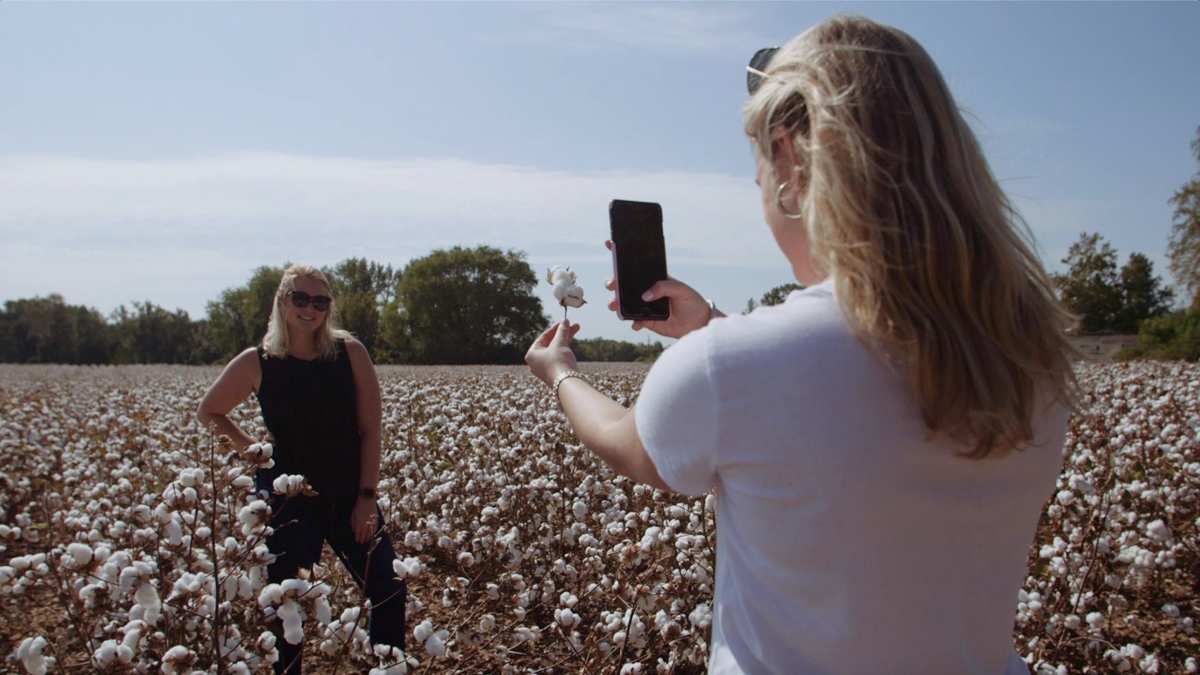HanesBrands Produces Documentary Following Its Supply Chain

HanesBrands has announced the kickoff of its Crop to Campus initiative, a third-party behind-the-scenes look at what goes into a responsibly made t-shirt. Winston-Salem, North Carolina-based HanesBrands invited three university students to follow the supply chain of its ComfortWash apparel line and experience each step along the way, from a cotton farm in eastern North Carolina, to a yarn-spinning facility in Tennessee, to its cut, sew and dye facilities in El Salvador. The mini documentary Crop to Campus will debut October 8 with a virtual event in conjunction with RiverRun International Film Festival. HanesBrands participates in the promotional products industry as suppliers Hanes/Champion/ComfortWash (PPAI 191138, S10) and Alternative Apparel (PPAI 217134, S5).
The project kicked off in 2019 as HanesBrands wanted to know how its commitment to sustainability measures up with Millennials. The company invited three college students to assess its supply chain, giving them full access to its facilities, people and processes. All of the students were seniors at the Wilson College of Textiles at North Carolina State University, one of the preeminent textile programs in the country; all are in sororities where they order printed t-shirts for events many times a year; and all are Millennials with concerns about the future.
“We have always had a strong CSR program, and responsible manufacturing has always been a huge priority for us,” says Chris Fox, vice president of corporate social responsibility for HanesBrands. “But while we are confident in how we manufacture, how we treat our employees, and how we support communities where we do business, we wanted to hear from some of the best, brightest and toughest CSR critics on the planet: college students invested in the health and success of our planet and our people.”
The students featured in the documentary film, now graduates, are Mamie Trigg of Austin, Texas; Katy Powers of Charlotte, North Carolina, and Sydney Parker of Lexington, North Carolina.
“The idea was to let the students immerse themselves in the experience and let them share their perspective via social media,” says Michael Johnson, director of marketing for Hanes Activewear. “But we quickly realized, from their excitement and energy that documenting the experience in a larger way could be a great story in itself.”
Johnson reached out to documentary filmmaker Rod Murphy to follow the students from Crop to Campus. Murphy, based in Asheville, North Carolina, has won 14 awards for his first four documentary feature films. His work has been screened internationally at festivals and on public and cable television.
“This was a great project primarily because of the openness of everyone involved, and no topics were off the table,” says Murphy. “As seniors, the students came into this project at a crossroads where they are passionate about textiles and apparel, but deeply concerned about fashion’s impact on the future of the planet.”
Starting with David Grant, a fifth-generation farmer in eastern North Carolina, Grant and the students talked about water conservation, limited pesticide usage, science and politics. In El Salvador, the students asked questions about responsible sourcing, global footprint and living wages.
“Especially in the printwear industry, transparency is paramount,” says Johnson. “Many printwear companies talk about sustainability, but are they willing to open their doors? The ultimate judges of a brand’s commitment to sustainability is your customers. Today’s students are more aware and more understanding of the significance of environmental and societal responsibilities. We wanted to give them the freedom to talk about the Hanes sustainability experience.”
To frame the experience for the project, the students followed the path of the ComfortWash Garment Dyed Apparel Collection, with garment-dyed tees and fleece being go-to styles at retail and on college campuses. In addition, Hanes ring-spun collections follow this same highly sustainable supply chain. The students walked the cotton farm on a dry, 90-plus degree day in the middle of harvest; they worked machinery alongside cutters and sewers and pulled fabric from huge state-of-the-art dyeing machines; and they toured the on-site biomass and water treatment facilities, seeing firsthand the water returned to local waterways cleaner than initially collected. They also spent a lunch hour volunteering with employees at an after-school program designed to engage and support at-risk youth; then they designed, had printed and wore the shirts produced from that exact supply chain. At the very end, the students met with senior leadership at HanesBrands to share their insights about the experience and what was important to them.
According to the students, one of the biggest takeaways was the meaning of the word “sustainable” and how it encompasses “transparency” and “responsibility.” “A lot of people when they think of sustainability, they think it’s an item that’s been recycled or reused,” says Parker. “I now know that there is an ethical and human aspect to it.”
In addition to the RiverRun International Film Festival, excerpts from Crop to Campus will be shared on social media in short episodes throughout September and October. The film can also be viewed as part of special event viewings that will include discussion panels with the filmmaker and students.

